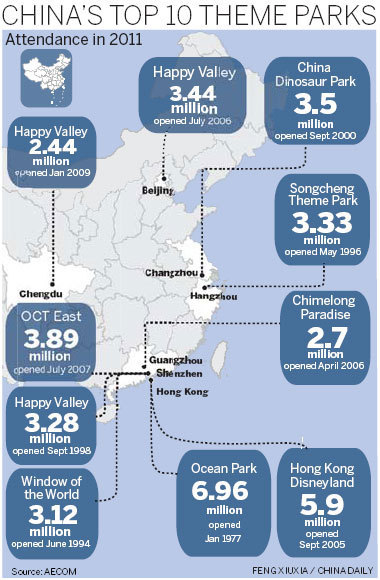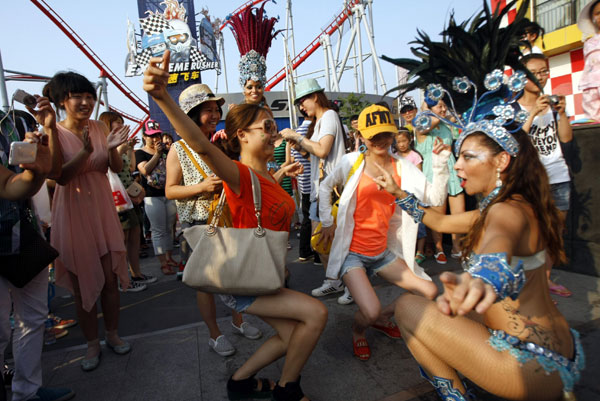Amusement parks boost real estate market
Updated: 2012-08-21 07:32
(China Daily)
|
||||||||
Nearby apartments, hotels prove profitable for project developers
When visiting a theme park in China, listen for the shrieks as the roller coasters whiz past and the bumper cars collide.
Chances are, the loudest such screams of joy are from the investors.
|
 |
Amusement parks are a booming business in China. But although attractions are springing up nationwide, industry insiders say the trend has less to do with tapping the thrill-seeker market and more to do with securing prime real estate.
Theme parks in Asia sold a combined 103.3 million tickets last year, one-third of the total in the world and second only to those sold in North America (127 million), according to AECOM, a consultancy firm in Hong Kong.
And unlike the US, East Asia is seeing a growing number of new attractions.
Chris Yoshii, an analyst for AECOM, told USA Today recently that almost a third of China's 2,500-plus theme parks have opened within the past two years, with the total number expected to surpass that of the US by 2020.
However, a 2010 study by the firm found that at least 70 percent of these attractions are actually losing money, with the real profits coming from adjacent projects.
Feng Yuguo, secretary-general of the China Association of Amusement Parks and Attractions, said that fact doesn't worry investors.
"Many investors don't mind losing money operating theme parks, since the sales of tickets and food make up only a very small percentage of their profits," Feng said.
"The major part comes from the adjacent commercial and residential developments, including apartments, villas and hotels."
Profit model
Victory Kingdom in Tianjin, which borders Beijing, has made 20 million yuan ($3.14 million) since opening its doors on July 7.
Yu Gui Garden Investment Group, a real estate developer from Guangdong province, invested 3 billion yuan in the project. Yet an insider who did not want to be identified said the villas and hotels now under construction nearby are expected to turn a bigger profit, and faster.
"Many foreign-funded enterprises have settled in the area in recent years, as it was made an economic and technological development zone in 1991," said Wang Zhen, the park's publicity officer.
The zone has led to 90 billion yuan being invested in the past two decades and an influx of 1,200 enterprises from 50 countries and regions, creating about 125,000 jobs.
"As transportation gets more convenient, we believe we will get more visitors in the future than the 150,000 we received in the first month," Wang said.
He added that the second phase of the park, which is twice the size of the part already open to the public, is scheduled to open next year.
As Victory Kingdom brings an influx of people ready to part with their hard-earned money, industry analyst Shao Gang predicted the zone will enjoy boom times over the next five years, with hotels, shopping malls and restaurants soon arriving to get a piece of the action.
"Many (developers) are trying the same model," the deputy director of EntGroup Consultants in Beijing said. "They buy land at a relatively low price to build a theme park and then erect adjoining apartments and hotels."
Unlike residential developments, the restrictions imposed by the State Council to cool the "hot" property market do not apply to projects classified as cultural or for entertainment purposes.
As this is the case, theme parks have become attractive investments to major real estate companies.
 |
|
A samba dancer interacts with visitors at the Happy Valley amusement park in Beijing in July. An Xudong / for China Daily |
Roundabout course
Traditionally, funding for adventure parks has come from established industry players, such as Overseas Chinese Town Group and Shenzhen Huaqiang Holdings, or multinational entertainment groups, such as Walt Disney Co, which is set to open its first theme park on the Chinese mainland, in Shanghai, in 2015.
However, largely due to the nation's housing market restrictions, about one-third of China's top 100 property developers have now entered the tourism real estate sector, including industry giants Vanke and Wanda, according to China Venture Group, a research and consulting company.
According to 5u588.com, a Chinese tourism-industry information website, 70 tourism real estate projects have already been signed this year, with a total investment of 260 billion yuan. That figure is expected to surpass 1 trillion yuan by December.
To prevent companies getting around the restrictions, however, Beijing city authorities in August last year banned the construction of new theme parks over a certain size.
The move prompted the cancellation of many projects in the capital, Shao added.
Making profits from commercial and residential developments "is something that everyone in this industry knows", said an employee of an amusement park in Tianjin who spoke on condition of anonymity.
"Parks require a lot of funding and have high operating costs, so it can take a long time for investors to recoup their money," he said.
And not all of them do.
According to Shao, many theme parks built in the early 2000s have gone bankrupt, with the properties failing to sell at dozens of auctions over the past seven years.
"The development of the theme parks in China has taken a roundabout course, especially in the early years," said Feng from the China Association of Amusement Parks and Attractions. "Although some theme parks are operating well and making some money, like Happy Valley, many are still in debt."
An increase in theme parks is good news for thrill-seekers, but Feng said investors need to be prudent, to avoid finding themselves on a financial roller coaster.
Ji Jin contributed to this story.
zhengxin@chinadaily.com.cn

 Relief reaches isolated village
Relief reaches isolated village
 Rainfall poses new threats to quake-hit region
Rainfall poses new threats to quake-hit region
 Funerals begin for Boston bombing victims
Funerals begin for Boston bombing victims
 Quake takeaway from China's Air Force
Quake takeaway from China's Air Force
 Obama celebrates young inventors at science fair
Obama celebrates young inventors at science fair
 Earth Day marked around the world
Earth Day marked around the world
 Volunteer team helping students find sense of normalcy
Volunteer team helping students find sense of normalcy
 Ethnic groups quick to join rescue efforts
Ethnic groups quick to join rescue efforts
Most Viewed
Editor's Picks

|

|

|

|

|

|
Today's Top News
Health new priority for quake zone
Xi meets US top military officer
Japan's boats driven out of Diaoyu
China mulls online shopping legislation
Bird flu death toll rises to 22
Putin appoints new ambassador to China
Japanese ships blocked from Diaoyu Islands
Inspired by Guan, more Chinese pick up golf
US Weekly

|

|







